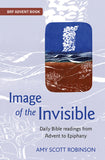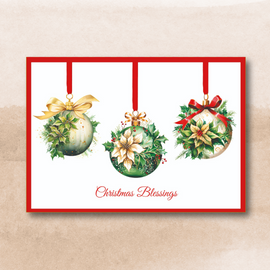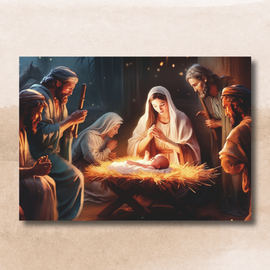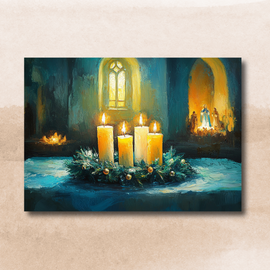Image of the Invisible: Daily Bible readings from Advent to Epiphany
Finding God in scriptural metaphor
When you hear the name ‘God’, does an image come into your head? Do you think of him as a shining light, or with a human shape, or as an anchor in the storm, a rock, a fortress?
As we look towards celebrating the incarnation at Christmas, we consider how God chose to express himself, in a moment in history, as a tiny baby. But what other images describe God in the Bible, and what can we learn about his character through them? How does an invisible God reveal himself to us in scripture and in Jesus? Amy Scott Robinson, a poet and storyteller, answers this question with imagination and a close reading of the text.
| Title | Image of the Invisible: Daily Bible readings from Advent to Epiphany |
| Author | Amy Scott Robinson |
| Description | When you hear the name ‘God’, does an image come into your head? Do you think of him as a shining light, or with a human shape, or as an anchor in the storm, a rock, a fortress? |
| Details |
|
When you hear the name ‘God’, does an image come into your head? Do you think of him as a shining light, or with a human shape, or as an anchor in the storm, a rock, a fortress?
As we look towards celebrating the incarnation at Christmas, we consider how God chose to express himself, in a moment in history, as a tiny baby. But what other images describe God in the Bible, and what can we learn about his character through them? How does an invisible God reveal himself to us in scripture and in Jesus? Amy Scott Robinson, a poet and storyteller, answers this question with imagination and a close reading of the text.
Amy Scott Robinson is an author and performance storyteller. After studying English at Christ's College, Cambridge, she trained as a teacher and began writing for charities and providers of liturgical resources, before publishing her own works on puppetry and story. She is married to the rector of four rural parishes in Suffolk, where she is also the benefice children’s worker. She lives in the Rectory and has two children, two guinea pigs, and at any given moment, a half-finished cup of cold tea.
To read Amy's lockdown blog click here.
Amy Scott Robinson’s selection of daily readings and commentary makes for a powerful and transformative Advent journey. Taking the hardest little word of all, that word 'God', a word that can be everything or nothing, a word that seems to carry no image with it and evades our understanding at every turn, Amy takes us on a journey through scripture in which she makes biblical image after image richly available to our imaginations so that we can come closer to God as he comes closer to us in Advent. I am particularly impressed by the way she thinks about the arts and engages the artistic imagination without ever losing the common touch or the simple but illuminating turn of phrase. Strongly recommended.
Malcolm Guite, priest and poet
Amy is an expert storyteller, a well of emotion and reflection, and a follower of Jesus with a deep, genuine hunger for the reality of God. This fine book, helping us reach out to the Father, is filled with who she is.
Adrian Plass, author and speaker
Sometimes we need a poet’s eye to see the God of the Bible afresh. Poet, storyteller and theologian Amy Scott Robinson uses the Bible’s own metaphors of God as artisan, metalworker, consuming fire and others to lead us more deeply into our understanding of God. If you like C.S. Lewis, Malcolm Guite or Lauren Winner, you will love this outstanding book of thought-provoking, gasp-inducing, beautiful devotions to enrich your vision of God.
Tanya Marlow, author of Those Who Wait: Finding God in disappointment, doubt and delay
What a stunning gift this book is! Open it day by day as you ponder the God who reveals himself as a burning bush, weaver, gardener, shepherd, king, and, of course, baby. Amy Robinson helps us to unwrap the images of the invisible, the God who became flesh. Her book is a masterpiece of metaphor, a creative unlocking of what we might have missed. Through her creative, thought-provoking, deep and winsome writing, she leads us to the God who makes himself known.
Amy Boucher Pye, author of The Living Cross
Reviewed by Lucy Rycroft in her blog The Hope Filled Family
This extraordinary book, one of the best Advent Bible studies I’ve seen, is for those wishing to go deeper in their discipleship this Advent, and are prepared to set some time aside for the purpose. Amy Scott Robinson bases her devotions on different ways God appears or is described in the Bible – such as a burning bush or pillar of cloud, a potter or weaver, bread or rock. Taking something tangible and often so closely linked to our experience is a wonderful way of helping us get to know God better this Advent season. There are questions at the end of each section, as well as small group materials and plans at the back of the book, so it would work well as an Advent study for small groups.
Transforming Ministry online November 2020
Described as one of ‘four outstanding books from Advent 2019 which you may have missed and are still in print', this book 'Provides daily readings helping us to find God using beautifully wrought scriptural metaphor.'
The Reader online 21.11.19. Review by Roger Thornington
This is an amazing book, subtitled ‘Finding God in scriptural metaphor’. After a few introductory biblical verses, Robinson transforms mundane observations from daily life into mesmerising accounts of God in action and potentially at work in our lives. The inventiveness and creativity of Robinson’s storytelling skill makes for a scintillating read.
She writes – ‘the Bible is full of metaphors for God, images that help us to experience a little of his character’. Various metaphors are explored and how they take us into a deeper understanding of God’s nature and our relationship with Him. The influence of the early church’s ‘O Antiphons’ is acknowledged in Robinson’s personal selection of metaphors.
Her eye for the telling detail in her observations, coupled with the directness of her narrative style, make this an excellent guide for both individuals and small groups wanting a guide on the well-trodden path from Advent to Epiphany.
The five weeks are explored under individual themes: ‘When God appears’, ‘God the Creator’, ‘God the Owner’, ‘Veiled in flesh’ and finally ‘Visible in Creation’. Each day has a few biblical verses relating to the particular theme. There are twenty Old Testament and seventeen New Testament verse selections. The daily comments are followed by a question to ponder, a suggestion to consider and a brief closing prayer. At the end of each week there are a couple of general questions on the theme considered. The final pages include brief suggestions and guidelines for five weekly group Bible studies.
I found this an exciting book with unexpected links amidst the twists and turns in the narrative. Robinson comments ‘God does not give us what we’re looking for – He gives us what we need’. If you are searching for an Advent book this year, this is what you need!
Reviewed by Roger Thornington
Church Times 25.10.19 Advent Books Round Up by David Wilbourne
In her Image of the Invisible, Amy Scott Robinson explores 37 metaphors for God-in-Christ. She crafts a prose poem, ‘the best words in the best order’, from Advent Sunday to Epiphany, imaginatively putting flesh on her chosen biblical passage. Eschatology is realised when the Mayor of Coventry, after the devastating Luftwaffe raid, is surprised by King George VI, knocking on his back door: ‘Heavens above, it’s the King. We’d better look sharp.’ Scott Robinson’s God graciously ‘reads our poetry before it deserves to be seen’, greeting us, his brides, with a tearful ‘You look amazing!’ Elijah’s God of consuming fire graciously makes a little fire on Galilee’s beach to cook his friends breakfast.
Reviewed by Richard Frost
This excellent book provides a very valuable companion for the forthcoming seasons of Advent and Christmas.
Using a theme of metaphors and images, Amy Scott Robinson provides many valuable insights into different facets of God.
Beginning with an exploration of Old Testament figures, Amy explores how the metaphors involved reveal something about God – be that through a burning bush, a pillar of cloud and even a guinea pig. We are also introduced to the creative sides of God – not just the familiar ones of potter and inspirer of poetry but also of weaver and architect. A trip through the parables not only shows God as master, landowner and king but also explores a range of challenges about day to day living. The week which includes Christmas takes a slightly different approach, considering God in comparison to the characters of the nativity. The final period to Epiphany considers images of God as bread, water, door, rock and the gifts of the Magi.
Each reflection – one for every day of December and then up to Epiphany – also contains a suggestion for further reflection and a prayer. There are also other points at which to review our thinking and suggestions for group discussion.
Unlike many authors who write about themselves but seem to do so just for the sake of it, Amy Scott Robinson knows when and how to include such examples. She writes of normal day to day life and, crucially, keeps them totally relevant to the topic. Just don’t buy her a house plant, that’s all. As the reviewer, reading a book of daily reflections one after the other without the benefit of 24 hours in-between, I look forward to re-reading it as my part of my own journey through the coming season.
If you enjoy and relate well to the use of metaphors and images, you will enjoy and relate well to this excellent book. If you’re one who finds using your imagination more difficult, then this book will open up that aspect of your mind to great effect. Whatever makes you you, Image of the Invisible will provide a very valuable and helpful way to deepen your faith and knowledge of God this Advent and Christmas.
Richard Frost is the author of Life with St Benedict and writes a blog at workrestpray.com







